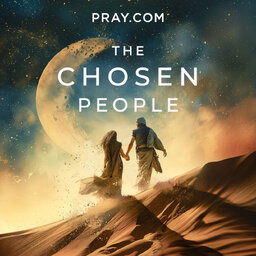Moses the Murderer
# 66 - Moses the Murderer - In this episode of The Chosen People with Yael Eckstein, we explore his defining act of passion, its consequences, and the lessons it holds for navigating faith and purpose in complex times.
Episode 66 of The Chosen People with Yael Eckstein is inspired by the Book of Exodus.
Sign up for The Chosen People devotionals at https://www.thechosenpeople.com/sign-up
For more information about Yael Eckstein and IFCJ visit https://www.ifcj.org/
Today's opening prayer is inspired by Psalm 51:10, "Create in me a pure heart, O God, and renew a steadfast spirit within me."
Listen to some of the greatest Bible stories ever told and make prayer a priority in your life by downloading the Pray.com app.
Show Notes:
(02:32) Intro with Yael Eckstein
(04:02) Moses the Murderer - Cinematic Retelling
(25:36) Reflection with Yael Eckstein
 The Chosen People
The Chosen People


